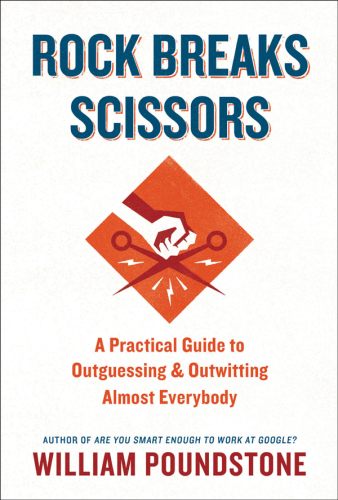
Rock Breaks Scissors
A Practical Guide to Outguessing and Outwitting Almost Everybody
کتاب های مرتبط
- اطلاعات
- نقد و بررسی
- دیدگاه کاربران
نقد و بررسی

April 14, 2014
In this intriguing and immensely useful volume, Poundstone (Are You Smart Enough to Work at Google?) examines how to outguess and outwit others in order to more accurately guess the outcomes of a variety of situations. In the first half of the tome, Poundstone examines those kinds of scenarios that are seemingly ruled by randomness—winning the lottery, guessing computer passwords, outwitting Ponzi schemes , and even besting other players in the childhood playground game from which this tome takes its name. But, he cautions, what seems to be random may be anything but. Quoting the mid-20th-century philosopher Hans Reichenbach, Poundstone notes that “‘persons not acquainted with mathematics... are astonished at the clustering that occurs’ in a true random sequence.” In the book’s second half, the author explores the idea of the “hot hand” theory, which posits that winning streaks are predictable. In that context, he explores such things as how to get the better of office football pools and how to outguess the stock market while offering educated strategies for coming out the victor in these situations. For anyone wanting to turn most of life’s odds in their favor, this is a solid, enjoyable read.

Starred review from April 1, 2014
An ingenious guide to outsmarting others by predicting their choices when they are trying to be unpredictable. Being predictable is difficult, writes business and science writer Poundstone (Are You Smart Enough to Work at Google?, 2012, etc.). When taking tests in which they are asked to write a series of random numbers, almost everyone avoids repeats such as 4444, but true randomness requires them. The authors of these tests fall into this trap, so if a correct answer in a true-false test is true, the following is more likely to be false and vice versa. If doubt remains, guess true, since 56 percent of true-false answers are true. Test authors must invent many wrong answers for every right one, and it's tempting to use shortcuts. The easiest is to insert "never," "always," "all" or "none," into a reasonable statement. Never choose these. On the other hand, if one answer is "all of the above" or "none of the above," the test author must carefully write the other answers around them, so why waste all that work? These are correct an astonishing 52 percent of the time. Many genuine insights on gambling, betting pools and the stock market have limited appeal, but the string of surprises continues. Thus, hot streaks (consecutive wins in any sport and other examples) occur as often as they do in roulette. In other words, they're purely random. "All of this book's applications are founded on one simple idea," writes the author. "When people make arbitrary, random, or strategic choices, they fall into unconscious patterns that you can predict." Malcolm Gladwell's Outliers (2008) and Nassim Nicholas Taleb's The Black Swan (2007) fascinated readers with evidence that reality regularly contradicts common sense. Poundstone delivers modestly useful advice for taking advantage of this, but mostly his book is another delightful addition to the everything-you-thought-you-knew-is-wrong genre.
COPYRIGHT(2014) Kirkus Reviews, ALL RIGHTS RESERVED.

June 1, 2014
The title makes it sound kind of like one of those shady get-rich-quick books, but this is, in fact, a smart, engagingly written account of how to capitalize on other peoples' predictability (while at the same time, if we're paying attention, minimize our own predictability). With the smooth readability of John Allen Paulos, whose Innumeracy (1988) has some thematic similarities, Poundstone explores how our tendencies toward uniformity and simplicity, even when we think we're being random and complex, leave us open to exploitation by people who know more than we do, like the fact that, when asked to pick one object out of five lined up in a row, most people will pick the second or fourth, or that, in the game rock/paper/scissors, most men choose rock, and scissors is the least popular choice by both genders. There's some mathematics herethe author explains what he's talking about in detailbut it's clearly explained and easily accessible to the general reader. An enlightening book, though, sadly, much of the enlightenment comes from realizing that we're not as clever as we thought we were.(Reprinted with permission of Booklist, copyright 2014, American Library Association.)

























دیدگاه کاربران